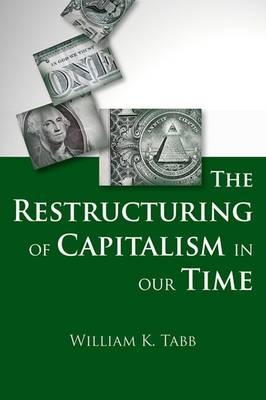
The Restructuring of Capitalism in Our Time
Seiten
2012
Columbia University Press (Verlag)
978-0-231-15842-8 (ISBN)
Columbia University Press (Verlag)
978-0-231-15842-8 (ISBN)
Actions taken by the United States and other countries during the Great Recession focused on restoring the viability of major financial institutions while guaranteeing debt and stimulating growth. Once the markets stabilized, the United States enacted regulatory reforms that ultimately left basic economic structures unchanged. At the same time, the political class pursued austerity measures to curb the growing national debt. Drawing on the economic theories of Keynes and Minsky and applying them to the modern evolution of American banking and finance, William K. Tabb offers a chilling prediction about future crises and the structural factors inhibiting true reform. Tabb follows the rise of banking practices and financial motives in America over the past thirty years and the simultaneous growth of a shadow industry of hedge funds, private equity firms, and financial innovations such as derivatives.
He marks the shift from an American economy based primarily on the production of goods and nonfinancial services to one characterized by financialization, then shows how these developments, perspectives, and approaches not only contributed to the recent financial crisis but also prevented the enactment of effective regulatory reform. He incisively analyzes the damage that increasing unsustainable debt and excessive risk-taking has done to our financial system and expands his critique to a discussion of world systems and globalization. Revealing the willful blind spots of mainstream finance theory, Tabb moves beyond an economic model reliant on debt expansion and dangerous levels of leverage, proposing instead a social structure of accumulation that places economic justice over profit and, more practically, institutes an inclusive, sustainable model for growth.
He marks the shift from an American economy based primarily on the production of goods and nonfinancial services to one characterized by financialization, then shows how these developments, perspectives, and approaches not only contributed to the recent financial crisis but also prevented the enactment of effective regulatory reform. He incisively analyzes the damage that increasing unsustainable debt and excessive risk-taking has done to our financial system and expands his critique to a discussion of world systems and globalization. Revealing the willful blind spots of mainstream finance theory, Tabb moves beyond an economic model reliant on debt expansion and dangerous levels of leverage, proposing instead a social structure of accumulation that places economic justice over profit and, more practically, institutes an inclusive, sustainable model for growth.
William K. Tabb is professor emeritus of economics at Queens College and professor emeritus of economics, political science, and sociology at the Graduate Center, City University of New York. He has been a visiting professor of economics at the University of California, Berkeley, and scholar in residence at Kansai University, Osaka, Japan. He is also the author of Economic Governance in the Age of Globalization.
Acknowledgments 1. The Centrality of Finance 2. Financialization and Social Structures of Accumulation 3. Realism in Financial Markets 4. The Shadow of the Financial System 5. The Coming Apart 6. Rescue and the Limits of Regulation 7. Nations, Globalization, and Financialization 8. The Present in History References Index
| Erscheint lt. Verlag | 3.1.2012 |
|---|---|
| Verlagsort | New York |
| Sprache | englisch |
| Maße | 152 x 229 mm |
| Themenwelt | Sozialwissenschaften ► Politik / Verwaltung ► Europäische / Internationale Politik |
| Wirtschaft ► Betriebswirtschaft / Management ► Finanzierung | |
| Betriebswirtschaft / Management ► Spezielle Betriebswirtschaftslehre ► Bankbetriebslehre | |
| Wirtschaft ► Volkswirtschaftslehre ► Finanzwissenschaft | |
| ISBN-10 | 0-231-15842-4 / 0231158424 |
| ISBN-13 | 978-0-231-15842-8 / 9780231158428 |
| Zustand | Neuware |
| Haben Sie eine Frage zum Produkt? |
Mehr entdecken
aus dem Bereich
aus dem Bereich
warum unser Geld stirbt und wie Sie davon profitieren
Buch | Hardcover (2024)
FinanzBuch (Verlag)
30,00 €
denken und handeln wie ein professioneller Trader
Buch | Softcover (2023)
Vahlen, Franz (Verlag)
36,90 €


